Wine, Restaurants and a Kitchen Store
| 2017 Q4 | story by Mike Anderson, photos by Steven Hertzog
-Confucius
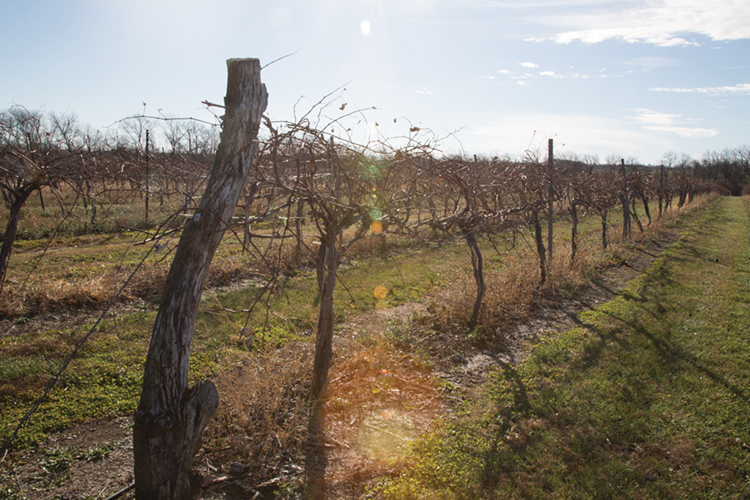
Blue Jacket Winery
When Brad Moore, a fourth-generation farmer, wanted to open a kitchen store in Lawrence, Kansas, he first had to tell his dad. As you can imagine, this was not an easy conversation to have. They don’t exactly make a card saying, “So you know that occupation that you do, and that your dad did, and that his dad did? Yeah, I think I’d rather open a kitchen store.” Ask Tim Grace what the most nerve-racking part about quitting his steady job in Hawaii working on battleships to start a restaurant in Lawrence was, and he’ll tell you: convincing his parents. And, even though Pep Selvan was well past 40 when he decided to leave his six-figure construction business for a winery in Kansas, the most daunting task was, you guessed it, telling his father. Selvan directly quotes his father: “A winery should be the last thing you do when you move back to Kansas.”
These three individuals decided to leave one career for a completely different career, all in the vicinity of Lawrence. Even though all were well into adulthood with kids of their own, the approval and support of their parents was still very instrumental. More importantly, their parents’ support was, in each case, directly correlated to their success.
Selvan’s father used his farming equipment to help with costs and construction of his new winery. Moore’s kitchen store on Massachusetts Street would not have been possible without the support of his father. And Grace’s parents couldn’t be happier for him, and now they get to see their grandkids.
So why would someone completely uproot his or her family and change careers? We aren’t talking about going from apples to oranges. We’re talking about going from apples to hair dryers.
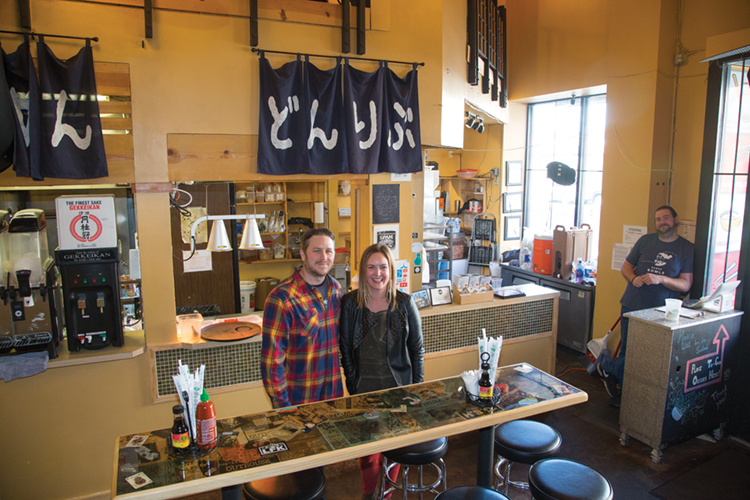
Tim and Shantel Grace inside Ramen Bowl
Tim and Shantel Grace
The husband and wife duo had always wanted to run a business together. They currently own and operate Ramen Bowls and Luckyberry in Downtown Lawrence. The inspiration for both of these restaurants came from their years in Hawaii. “Hawaii is a melting pot of cultures, which opens your eyes to different foods,” Shantel says. The healthy lifestyle of the surfer culture had an influence on her and Tim. The idea of acai smoothies, spicy tuna bowls and cold-pressed juices came from that culture.
“The surfers have this ‘Let’s stay out on the water all day and have food to fuel us’ mentality,” Shantel explains. This was the basis for Luckyberry, a juice café that specializes in healthy, protein filled foods and cold-pressed juices, and is operated by the Grace’s and business partner Dalton Paley. Ramen Bowls was inspired by the Asian influence in Hawaii.
Tim and Shantel would consistently have ramen for happy hour. They appreciated the familiar and comforting feeling of the food. So, when they read about ramen shops popping up in the States while on an airplane, they were hooked. Within 48 hours, they were Skyping with a man in Japan about the best way to make ramen.
For four years before in Hawaii, Tim had been a protective-coating specialist who worked on destroyers, oil tanks, petroleum tanks and other ships for the Navy and Air Force. His job was to assess and inspect these water vessels in order to make sure their exteriors could endure the elements and missions. For example, a ship such as the USS Missouri (on which Tim worked) would quite possibly need Macropoxy 920 or Polysiloxane for the topside, and Duraplate for the underwater hull. Tim has gone from talking about underwater coating for destroyers to talking about organic, gluten-free oats for acai bowls.
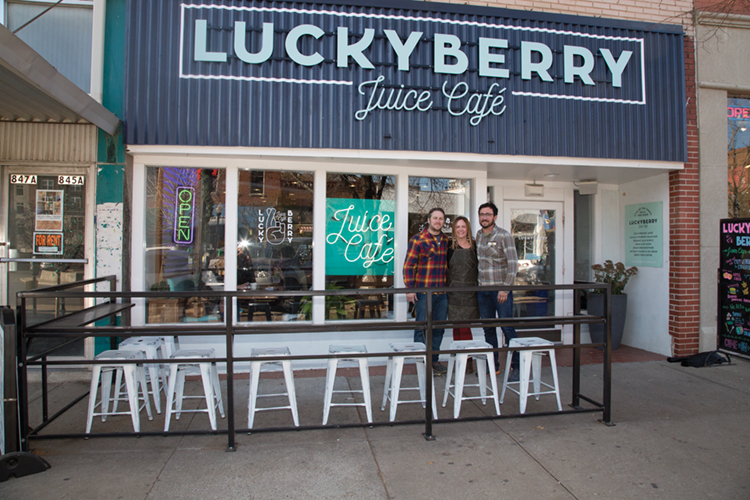
Tim and Shantel Grace, Dalton Paley outside their Luckyberry Juice Café.
But, if you think his transformation is remarkable, just listen to Shantel’s old gig. She was a journalist in Hawaii working on her master’s degree in English. She worked for Honolulu Weekly writing stories on everything from Hawaiian culture to sex trafficking. Before that, Shantel was a country singer-songwriter with ties to the Nashville scene. A quick iTunes search is all you need to find her albums. She even won the Colgate Country Competition for the state of Hawaii and competed in the national competition in Seattle. Her original and winning song was fittingly called, “What If I could.” She finished her singing career a few years ago when she got to sing the National Anthem at the Uptown Theater in Kansas City, Missouri, before a speech by then-President Obama. The President must have loved the rendition, because it was Obama’s staff that ordered Ramen Bowls for dinner when the President spoke on the University of Kansas (KU) campus in 2015.
While in Hawaii, the Grace family decided to move back to Lawrence so their two boys could be closer to their parents and the rest of their family. They knew they wanted to open the shops in Lawrence. Both had attended KU and knew this town embraced global cuisine. They were able to use their past careers to help them succeed at their new ones.
“Being a musician taught me that I don’t wait for people to find me,” Shantel explains. “I’m going to find them.”
Tim used his understanding of the importance of processes and recipes from his old job to help him at his new one. And both have succeeded, but the transition from Hawaii to the restaurant business in Kansas was not without its hurdles.
A couple of weeks before the soft opening of Ramen Bowls, Tim and Shantel were supposed to receive help. The celebrated Malaysian chef who they had been training with for six months was scheduled to spend three weeks with the couple, helping them with their brand-new restaurant. The Graces went to pick up their ramen teacher from the airport, but he was nowhere to be seen. “There we were, watching the last of the baggage go through baggage claim, and he was nowhere to be found,” Shantel explains. “Finally, we reached someone who told us he has been escorted back on the plane and sent straight back to Singapore. My legs gave out from underneath me, and I just sat there and bawled.”
The chef apparently brought a personal visa instead of the work visa he needed. With no restaurant experience, the Graces embarked on the most difficult three weeks of their life. But, at the end of those three weeks, they opened their first restaurant. It’s been a success ever since. A constant name in the Best of Lawrence competition, Ramen Bowls won Best Take Out in 2017. And, starting in December, Ramen Bowls will expand to its new location on Massachusetts Street.
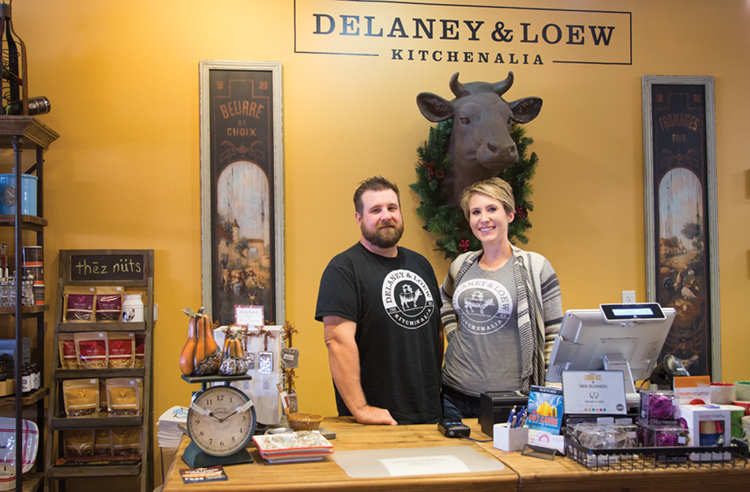
Katie and Brad Moore at Delaney & Lowe Kitchenalia.
Brad and Katie Moore
Brad and Katie Moore also met at KU, but instead of taking off for Nashville or the Aloha State, they headed to Oberlin, Kansas. For 12 years, the couple ran a cow/calf operation that included 3,000 cattle and 150 bulls. They also harvested corn and wheat, farming 5,000 acres of corn and 1500 acres of wheat. Brad was a fourth-generation farmer, and his grandfather was still farming at the age of 83. But, while farming was something Brad was used to, it wasn’t exactly his passion.
“Think of the hardest job mentally and physically and times it by 10,” Brad says of farming. “Farming involves a lot of variables you can’t control. You’re at Mother Nature’s mercy, the mercy of industry, and the mercy of the markets.”
After the particularly unforgiving weather from 2012 through 2014, Brad and Katie started a conversation about leaving. With constant droughts in the summer and blizzards in the winter, the outlook on the farm economy looked bleak. During this time, the couple had become regulars at a kitchen store in Nebraska called Knowlen and Yates. They had become, as they call it, “kitchen-store junkies.” The conversations of leaving the farm life became more real when Katie suggested they should not only move to Lawrence but also start their own kitchen store on Mass Street.
“We already made one giant move, why not keep that momentum,” Katie recalls. Brad had always wanted to come back to Lawrence, and while their three kids might miss the tractors, they’d always have the best kitchen on the block. As one can imagine, the 10-month transition between quitting farming and starting a kitchen store is complicated. Not only did the Moore’s fear the unknown of whether a kitchen store would succeed in the Lawrence market, they also had to come up with the inventory. For most people, it’s tough to look at a blank screen and know you have 2,000 words to type. Brad and Katie had to look at a blank store knowing they had to fill it with 11,500 kitchen items.
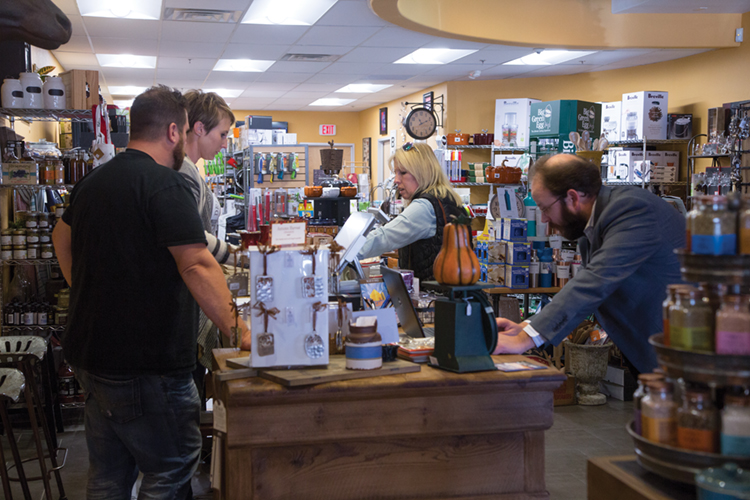
Katie and Brad Moore assist customers at their Delaney & Lowe Kitchenalia.
So, they did their research, spending those months going to trade shows around the nation, talking with sales representatives and leaning heavily on their friendship with the owners of their favorite kitchen store in Nebraska. And, with help from their parents, they opened Delaney and Loew. The story behind the name is so interesting and unique, next time you’re in the store, be sure to ask.
A couple of years ago, the couple was standing in a field pulling calves out of cows, and now they’re discussing the latest kitchenware from France. While snow used to signal havoc on the cattle and exhausting days on the farm, now it means the start of holiday season and the busiest time of the year.
“Yeah, I look at snow a lot differently now,” Brad explains. Much like Tim and Shantel, the joy in which Brad and Katie discuss their products is infectious. From Mason Cash mixing bowls to Emile Henry ceramic pots to Vita Craft pans, the store seems to carry it all. The owners want you to go home with an item that will last a long time, and they still carry the same work ethic and grit from their farming days. It’s now directed to your kitchen.
“You got it to do,” is the mentality Brad keeps from his farming days. And, it has paid off. Delaney and Loew won the Best New Business award at the Best of Lawrence this year. Because of where Brad and Katie have been, they not only have an appreciation of where food comes from but also have an appreciation of how it’s prepared.
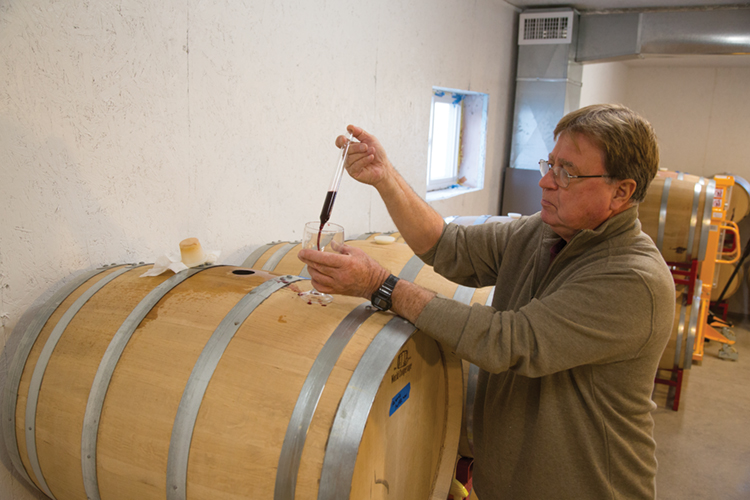
Pep Selvan tasting from the barrel of his soon to be award-winning St. Vincent wine at Blue Jacket Winery.
Pep Selvan
Not a stranger to long days, for 20 years, Pep Selvan would often work six-and-a-half days a week. After graduating with an undergraduate degree from the University of Kansas, Pep decided to head west. A graduate of the University of Oregon in architectural engineering, Pep was supporting his wife and then two kids on an $11-an-hour job at an architectural firm. He realized the real money was in construction.
Pep was raised in a construction family, so the work was familiar to him. He started his own construction business in which he wore every hat. He negotiated the contract, did most of the design work, managed the construction crew at the job site and often worked on the crew. Pep went from making $11 an hour to $110,000 a year.
In between big jobs working on larger buildings, Pep’s crew built a solid reputation working on movie sets. He helped build sets for Nash Bridges, Flubber, The Game, Patch Adams and others. You might have seen Pep’s work in the movie, What Dreams May Come. That’s right, Pep’s team built Robin William’s hell house. Not too many people get to see that side of the movies.
“It’s a fantasy. It’s a combination of a lot of brilliant talented artisans who pull together their skills to give you this moment,” Pep explains.
But after a while, the long days of movie-making and traveling began to take their toll. It wasn’t uncommon to work 12, sometimes 18, hours straight. Then there was the commute. To show up on time often meant leaving the house at 3:30 a.m. “When you have to drive two-and-a-half hours to get out of L.A., that just doesn’t make sense to someone raised in the Midwest,” Pep says.
The seed of leaving California for Kansas had been planted in the early 2000s when Pep made a trip to Kansas to visit his friend, Greg Shipe, at the Davenport Winery and Orchards. There, he had some wine that changed his life. He took a case of the wine back to California to show it to all of his friends, even friends at Dean and Deluca. They were all floored. Californians were not used to liking Kansas wine. At that moment, he had his plan.
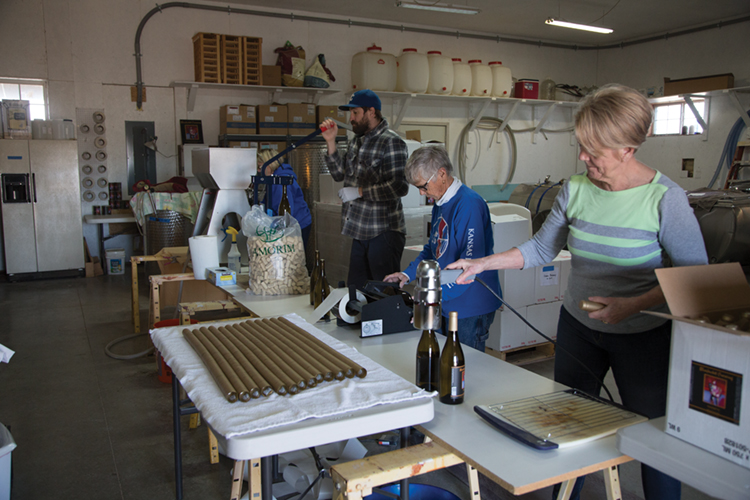
Bottling wine at Blue Jacket Winery.
At the request of his wife, he would wait until all three children finished high school to move back to Kansas (coincidentally, all three children decided to move to Lawrence, as well). There was only one problem with his plan: While Pep was familiar with building facilities for wineries in California, he had no experience in viticulture, growing grapes or making wine. So, he went to school, literally. He took classes at Missouri State University.
“I was taking as many classes as I could, learning through watching and hands-on experience. Books can only do so much,” Pep explains. He would also attend seminars at the University of Missouri and Iowa State University. During these several years, he would help Greg at the Davenport winery and volunteer at the Holy-field Vineyard and Winery, in Basehor. For Pep, it was a seven- to eight-year intense learning curve where new challenges gave way to new direction.
“In California, I knew a project was going to take ‘X’ number of months, and I could schedule people for that. I don’t have that now because we’re dealing with Mother Nature all the time,” Pep says. Since 2008, his vineyard and winery, BlueJacket Crossing, has been open and receiving praise. BlueJacket wines have won bronze, silver and gold medals from the Finger Lakes International Wine Competition. His wine has even won a Jefferson Cup Award. Pep has traded in his movie set constructions for semisweet whites and dry reds. He now talks about Titratable acids, pH levels and Brix measurements. His days of constructing sets have helped him transition to constructing wine.
“Consistency in wine-making is so important; that was also a big part of construction,” Pep explains. Managing contracts with people helps you become anal, which helps your attention to detail when growing grapes, he continues. “Each grape is like a different person with a different personality. When you’re just starting out, they never tell you that; you get to figure that out on your own. The discovery of a small modification can make the difference.”
Transitioning from one career to a completely different career may never be easy. The uncertainty, the fear, the doubt are all heightened by such a decision. Anyone who is willing to tackle something new are seemingly full of confidence. While these three transformations into different careers might seem different, they are also similar in several ways: They all came back to Lawrence because the town holds a special place for them. The idea of children and family played a role in the switch of careers for all of them. Whether it was waiting for kids to graduate, wanting them to go to school here or wanting them to be closer to their larger family, family was a driving force in every decision. And in each instance, the individuals were highly successful in their first career.
These people had attributes that transcend multiple careers. They are marrying their passion with their skills. Perhaps first careers are about financial responsibility to one’s family, which leads to pointing one in the direction of a passion. Or, as Pep puts it, “Your brain finally opens up.”
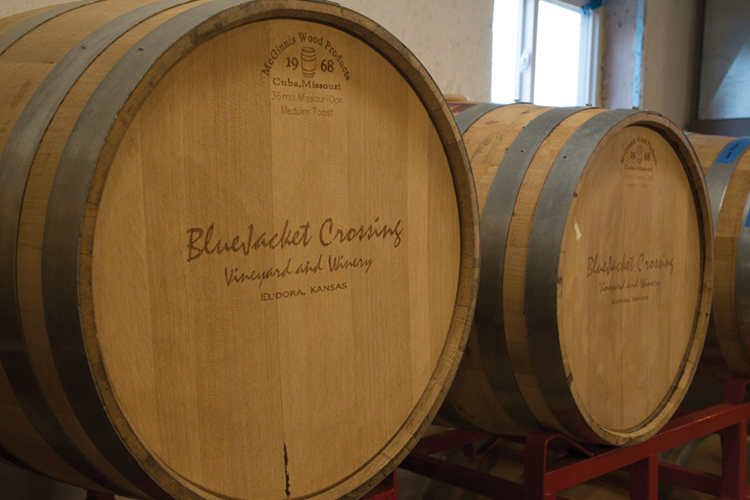
Aging wine barrels at Blue Jacket Winery.

4 Comments
349631 271561Hi! I discovered your website accidentally today, but am genuinely pleased that we did! Its not only entertaining, but in addition straightforward to make use of in contrast to lots that Ive viewed! 217429
It is perfect time to make some plans for the future and
it’s time to be happy. I’ve read this post and if I could I want to suggest you few interesting
things or advice. Maybe you can write next articles referring to
this article. I desire to read more things about it!
896302 849367This really is a excellent topic to talk about. Generally when I locate stuff like this I stumble it. This write-up probably wont do well with that crowd. I is going to be sure to submit something else though. 58080
66116 210876It is practically impossible to find knowledgeable men and ladies during this topic, even so you sound like do you know what you are discussing! Thanks 634918